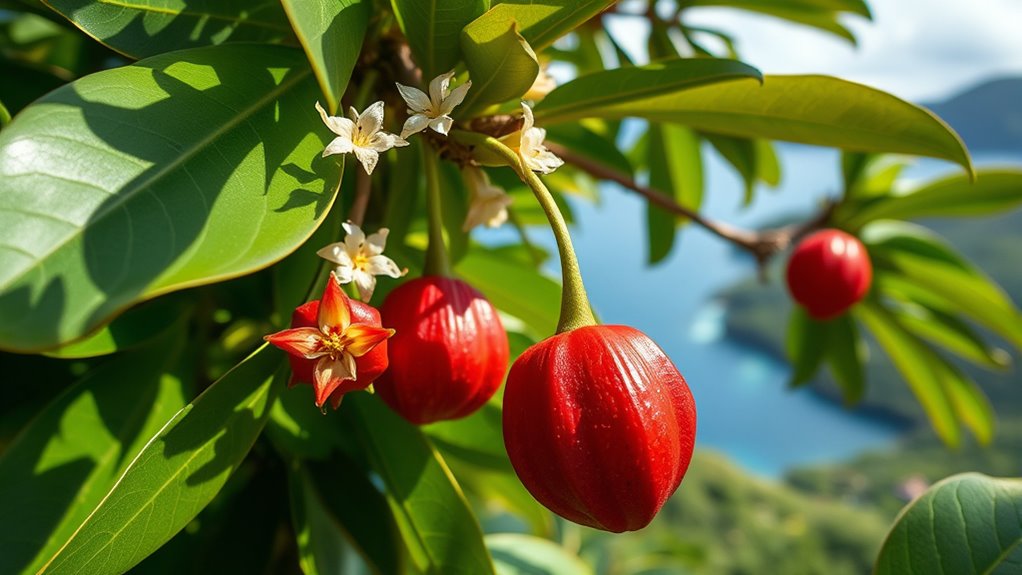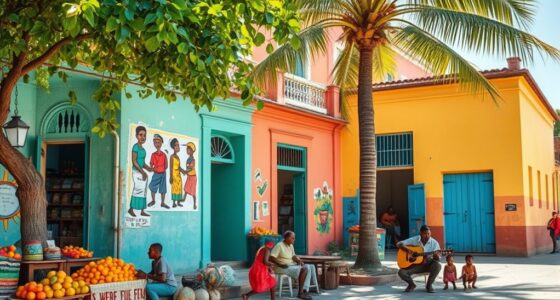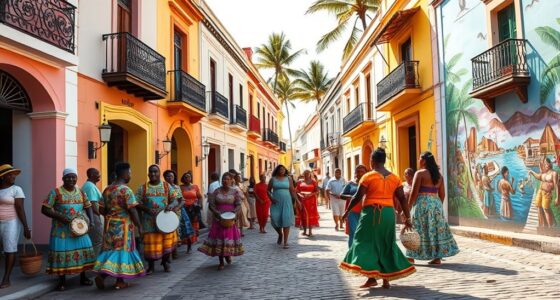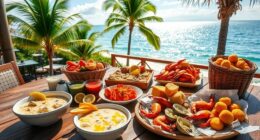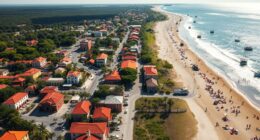You’ll find that Grenada is called the “Island of Spice” because its fertile volcanic soil and perfect climate have made it a major producer of spices like nutmeg, cinnamon, and cloves. Nutmeg, in particular, has shaped the island’s history, economy, and culture for centuries, as spice cultivation became essential for trade and local traditions. If you want to discover how this flavorful history continues to influence Grenada today, there’s much more to uncover.
Key Takeaways
- Grenada is called the “Island of Spice” due to its prolific production of nutmeg, cinnamon, cloves, and allspice.
- Nutmeg cultivation has historically been vital, shaping Grenada’s economy and global reputation for high-quality spices.
- The island’s strategic location during trade routes facilitated the export of spices, especially nutmeg, boosting its importance.
- Spice cultivation, especially nutmeg, is deeply embedded in Grenada’s cultural heritage and daily life.
- The aroma of spices like nutmeg continues to symbolize Grenada’s rich history and nickname as the “Island of Spice.”
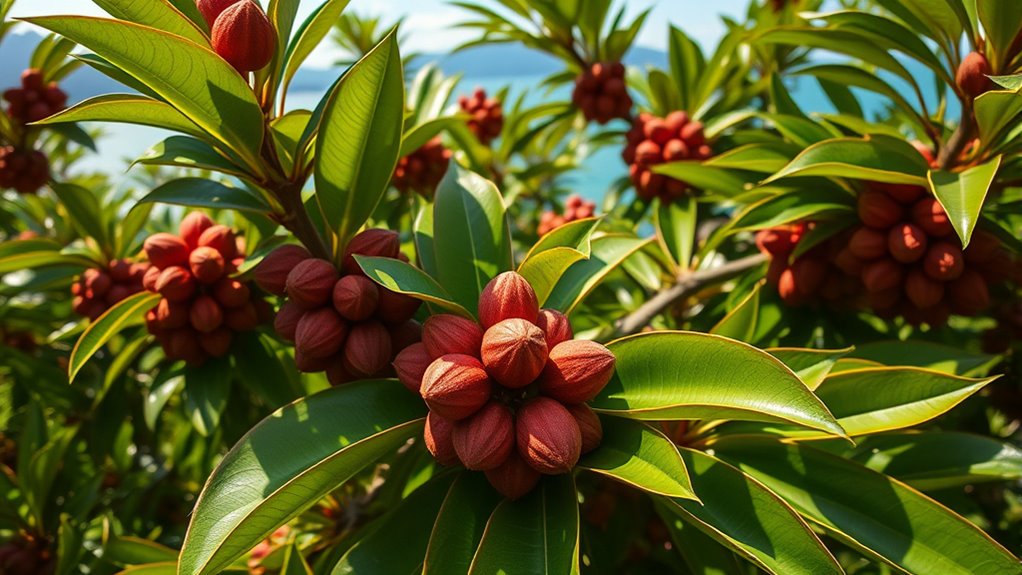
Ever wondered what makes Grenada stand out among Caribbean islands? It’s not just its stunning beaches or lush rainforests—it’s the rich aroma of its spice cultivation that truly sets it apart. Grenada is often called the “Island of Spice” because of its prolific production of nutmeg, cinnamon, cloves, and allspice, which have shaped its identity for centuries. When you walk through its markets or visit its plantations, you’ll see firsthand how deeply these spices are woven into the island’s culture and economy. The island’s ideal climate and fertile volcanic soil create perfect conditions for spice cultivation, turning Grenada into one of the world’s leading spice producers. This cultivation isn’t just about farming; it’s about tradition, heritage, and a global reputation that has been built over generations. Market significance also plays a crucial role in maintaining the island’s reputation and economic stability.
Historically, Grenada’s position along important trade routes played a pivotal role in its rise as a spice hub. During the Age of Exploration, European powers recognized its strategic location and turned it into a crucial stop for ships traveling between Europe, the Americas, and Africa. These historical trade routes facilitated the exchange of spices, enslaved peoples, and goods, which fueled the island’s economy and helped establish its reputation as a major spice supplier. Over time, the cultivation and export of nutmeg and other spices became the backbone of Grenada’s economy, drawing traders and merchants from around the world. You can imagine the bustling port towns, filled with ships laden with fragrant spices, as a proof of Grenada’s significance on these historic routes.
As you explore the island, you’ll notice that this history isn’t just in books—it’s alive in the landscapes and local stories. The legacy of spice cultivation still influences everyday life, from the vibrant markets to the traditions passed down through generations of farmers. The island’s role in these historical trade routes helped shape its diverse cultural fabric, blending African, European, and indigenous influences into its unique identity. Today, Grenada’s status as the “Island of Spice” is a proud symbol of its rich history and economic resilience. The aroma of fresh nutmeg and cinnamon continues to drift through the air, reminding visitors and locals alike that this tiny Caribbean island’s greatness is rooted in centuries of spice cultivation and its strategic position on global trade routes.
Frequently Asked Questions
How Did Grenada Become the World’s Leading Nutmeg Producer?
You might wonder how Grenada became the world’s leading nutmeg producer. It achieved nutmeg dominance through its ideal climate and fertile soil, making it perfect for cultivation. During the spice trade history, Grenada focused on expanding nutmeg plantations, boosting production and exports. This strategic growth and high-quality crops helped Grenada stand out, solidifying its reputation as the leading nutmeg producer and earning its nickname, the “Island of Spice.”
What Are Other Spices Cultivated on Grenada Besides Nutmeg?
You might be surprised to discover that Grenada’s tropical climate and rich soil support more than just nutmeg. Herbs cultivation thrives here, with cinnamon, cloves, and allspice adding aromatic flavors to the island’s spice repertoire. These spices grow alongside other tropical herbs, making Grenada a true spice haven. As you explore, you’ll realize that the island’s lush environment creates perfect conditions for a diverse array of aromatic treasures.
How Has Spice Trade Influenced Grenada’S Cultural Diversity?
You see, the spice trade has profoundly shaped Grenada’s cultural fusion and culinary diversity. As you explore the island, you’ll notice how different cultures—African, European, and Caribbean—blend through music, festivals, and cuisine. This vibrant mix stems from centuries of spice trading, which brought diverse peoples and traditions together. You’ll taste this influence in local dishes, experience it in lively celebrations, and feel the island’s rich, multicultural heritage.
What Environmental Factors Contribute to Grenada’s Spice Cultivation?
You might think climate alone determines spice cultivation, but it’s more complex. Grenada’s climate suitability, with warm temperatures and high humidity, creates ideal conditions. Rich, fertile soil enhances spice growth, especially for nutmeg and cinnamon. Consistent rainfall supports healthy plants, while the island’s volcanic soil adds essential nutrients. These environmental factors work together, making Grenada perfect for growing spices that thrive in its unique landscape.
How Does Spice Production Impact Grenada’s Local Economy Today?
You see, spice production greatly boosts Grenada’s local economy today. It drives spice exports, bringing in essential revenue, and provides jobs to many residents, supporting local employment. By cultivating and selling spices like nutmeg and cinnamon, you help sustain the island’s economy and promote its global reputation. This vibrant trade keeps Grenada financially resilient and preserves its identity as the “Island of Spice.”
Conclusion
Just like a spice blends perfectly into a dish, Grenada’s rich history is woven with nutmeg and other spices that shaped its identity. As you now know, this island isn’t just a tropical paradise—it’s a living spice jar, bursting with flavors that tell stories of conquest, trade, and culture. So, next time you think of Grenada, remember it’s more than just a beautiful place; it’s a fragrant tapestry, forever infused with the aroma of its legendary spices.

